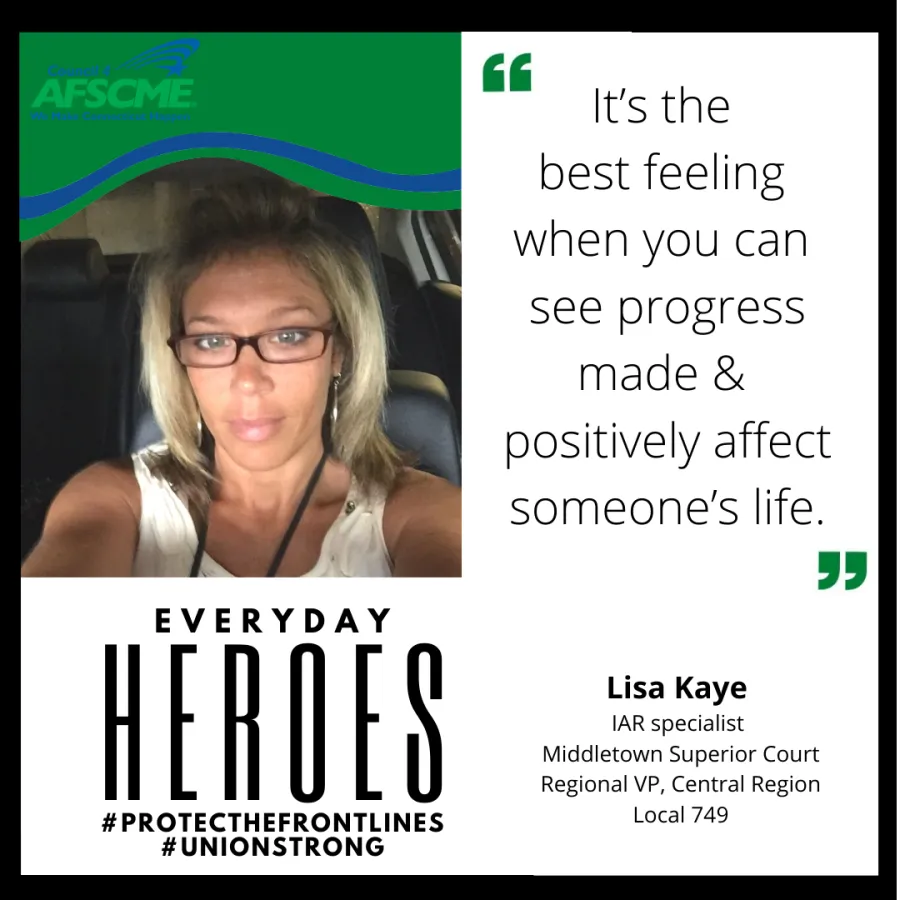Despite Court Closures, Judicial Worker Steps Up To Serve

The COVID-19 pandemic may have slowed some human activities; however, it cannot fully halt criminal ones. On the assumption there will be people breaking the law and arrested for doing so, there must remain mechanisms in place to protect the safety of the public.
One of the people who handles such mechanisms is Lisa Kaye of AFSCME Local 749 (State Judicial & Criminal Justice Employees). Kaye works in Middletown as an intake assessment, referral (IAR) specialist, also known as a bail commissioner, for the past 11 years.
Her job is part researcher and part community resource liaison.
“It’s not easy. I’ve been in different aspects of criminal justice social work for 21 years,” she said.
Kaye collects pertinent information on those arrested by running their records and conducting interviews. The information she collects may include past criminal history, job status, and parole or probation status. Each component carries a weighted value that helps determine her overall recommendation to the court for setting bond or releasing a client either with or without conditions. All these pieces combine to paint a picture that she presents to a judge who reviews the facts and decides next steps for a client.
For clients dealing with substance abuse or mental health issues, Kaye conducts proper referrals to contracted provider organizations that offer behavioral health, addiction, and primary care services. After the referral is made, she monitors their cases and checks in with providers to assess progression through the program.
“I think it’s the best feeling when you can see progress made and positively affect someone’s life,” she said, “and they can start turning things around and start to be a better member of society. We do see unfortunately a lot of cases where we don’t [see progress], but the ones that we do – that’s what makes it all the more worth it.”
Kaye is most proud to work with their Jail Re-Interview (JRI) program, which connects offenders with longer-term residential treatment programs to help them overcome more severe challenges such as heroin addiction. Since a referral to one of their typical providers may not be enough to overcome a dangerous drug addiction, the JRI program can serve as a more appropriate option.
“[It’s] one of the great programs we utilize which helps a lot of clients that are in higher need”, she explained. “We’re all coordinating together to have that program come to court that day to pick up the client and bring that client to the JRI bed for residential treatment.”
“Those are usually successful,” she added. “Sometimes it takes multiple bites at the apple to overcome that addiction, but it can happen.”
In every way, Kaye’s job has been altered by the COVID-19 public health crisis. Besides adjusting to a change in work hours, location, and safety procedures such as wearing PPE, new technology has also been introduced to allow employees like her perform job duties in a safer manner.
“I am doing virtual interviews with clients,” she said. “I can go on in front of my desktop and speak to them. I can see the inmate in the lock-up and they can see me, so everyone is safe. With anything new there are always challenges, but great ppl in IT made it easy as possible.”
As courthouses closed and Kaye’s working schedule downsized from 4 days a week to 3, to 2, and then to 1, grappling with the pandemic has been “unbelievable” and “surreal” for her. She is grateful for the support of the union in fostering communication and clarity among the judicial branch and its employees.
“We didn’t know a whole lot as it was going on because it happened so quickly”, she said. But then as things unfolded and we’ve had these meetings [with the judicial administration], I’ve been able to share important information with fellow workers who have been concerned.”
The nature of Kaye’s work means that it must go on and she brings a can-do spirit along with it.
“All in all, we’ve had to keep up with what we had to do to, either through home or going in on a part-time basis. As long as this is how the situation is, we’ll be here moving forward.”
